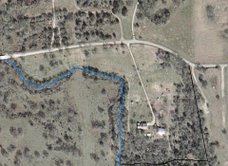Guineas are wonderful birds. They are watchdogs (watchbirds?) that squalk so loudly you have to hold your hands over your ears. They squalk at strangers, hawks, sounds, feathers, dirt, the sky and minor air movements. Get the picture? We started with 7 guineas. We lost one early on when I failed to realize the quickness of their development. They could fly before I was ready for them to fly. My little, portable chicken coop was pressed into service when we got the guineas. They took to it well as they had no choice. The coop was designed for chickens which don't generally fly very well. I had left the top 4 inches below the roof open for ventalation. One day I went out to feed them and they were all sitting on the top roost! So they were able to fly over 2 feet to the 2x2 roosts. Gah! I had to do something quick. I went and cut some impromptu screens out of hardware cloth. This was screwed over the openings. They still had plenty of ventilation but could no longer escape. A quick count however showed one missing. We looked around but it was gone, probably eaten by a possum, raccoon or cat.
Last weekend I put the guineas away just at dark. They are the last stragglers amoung the poultry to go to bed. A count showed 5 birds, six if you count the rooster but that's another story which I will come to presently. Since it was dark it was hard to see. I ran and got Miss Lyn and together we tried to find our missing bird. No luck. We trusted we would find her/him in the light of the next day, and sure enough we did. Miss Lyn was searching all those places that the chickens lay their eggs every day. One of the newer places is behind a small door in the goat barn. This door is about 4 feet wide but only 2 feet high. The door is always kept open, folded back against the inside wall of the building. The door is held in place by a cinderblock. Frequently the goats move the block around and the door comes away from the wall enough for a chicken to get behind it for the privacy she wants for egg laying. When Miss Lyn opened the door she found our missing guinea. It had gone in and could not get out and had died. As it was raining heavily I opted to bury the poor bird in the afternoon.
Several weeks ago our main rooster "Florshiem" was found dead on the floor of the barn. There were no marks on him and no reason could be found for his death. He was buried on the perimeter of the barnyard where he lived his whole life. This loss left us without a main rooster. We still have an emergency backup rooster, but as it is a ridiculous bird we won't acknowledge it. We needed a rooster. A mate for our flock of 9 Barred Rock hens. The hens lay eggs just fine without a Roo, but if we want to create new Barred Rock chickens we need a rooster for fertilization. We found a place that sells more or less full grown roos and bought one for $7.00 An exorbinant price for such a bird. However the benefits may outweigh the drawbacks if we get more chicks.
We let the roo go in the barnyard. Silly us, we should have locked it in the chicken (guinea) coop for 2 weeks so it would know where home was. I only read about that after the rooster disappeared. Yep, after the first night it was gone. After 3 days we were going to go get another one. I was in the barn with the box that we had picked the last one up in, when in the corner of the barn scratching around was our rooster!! It hadn't been eaten! The barred rock hens would pick on it mercilessly. Whenever the roo was anywhere nearby the hens would chase it off. Later that afternoon I saw the rooster go into the guinea coop, look around an come out again. That evening as I was shepherding the guineas into the coop I saw the rooster in there. So the roo was going to live with the guineas. Swell. Forget about fertilized Barred Rock chickens then. Turns out that the roo wasn't developed quite as much as we thought. He still had a few weeks to go before he started crowing. Now he hangs out with the chickens during the day and the guineas at night. We are happy with a full incubator, he is happy and the barred rock hens are happy that they have a guardian.
Our Farm is 15.3 acres near Bastrop TX, with goats, chickens, cats dogs and other assorted animals. We raise gourds, herbs,flowers and a kitchen garden. We will chronicle our adventures here warts and all. Mostly warts I think.
Tuesday, July 19, 2005
Subscribe to:
Posts (Atom)



